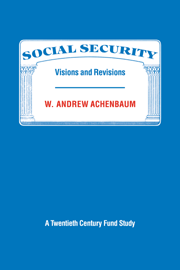Introduction
Published online by Cambridge University Press: 04 August 2010
Summary
Social security – the nation's largest, costliest, and most successful domestic program – has reached a critical juncture in its development. As its creators anticipated, nearly every wage earner now pays taxes into the system. In principle, all citizens may be eligible for “entitlements” at some point in their lives. Yet social security no longer enjoys solid popular support. Senior citizens worry that their benefits will be cut; younger Americans are skeptical – if not cynical – about their own benefits upon retirement. Social insurance, once viewed as an institution whose importance transcended politics, is now at the center of partisan debate in the United States.
Social security's basic orientation has not changed much over time. It continues to alleviate the financial miseries that threaten everyone in a modern society – from family tragedies that might reduce a wage earner's income to the economic uncertainties that accompany old age. Despite the program's continuity of purpose, “rights” to social security are not contractual; benefits are subject to alteration in light of changing economic conditions, legislative priorities, and judicial wisdom. From the perspective of seasoned experts, this is how the system should operate.
From the beginning, social security was intended to harmonize individual ambitions with civic responsibilities. It was born of the Great Depression, a crisis that proved once and for all that socioeconomic forces beyond individual control could result in mass unemployment, hunger, and familial disruption even in America.
- Type
- Chapter
- Information
- Social SecurityVisions and Revisions: A Twentieth Century Fund Study, pp. 1 - 10Publisher: Cambridge University PressPrint publication year: 1986



